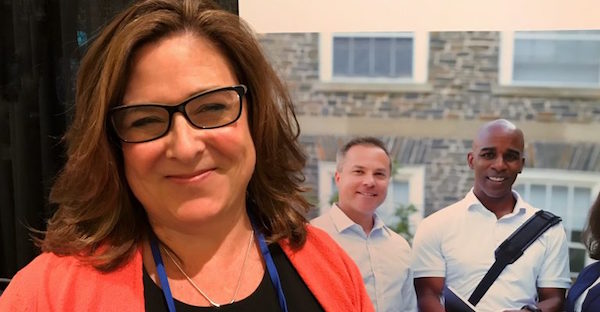
Q and A with SIM Director Sandra Toze
Management Dean Kim Brooks talks to Sandra Toze about challenges in the information management field, understanding how industries collaborate to share information and how alumni can stay engaged
The Faculty of Management has had the good fortune of recruiting outstanding directors to lead each of our four Schools. Many of you will have met or heard from Sandra Toze, Director of the School of Information Management (SIM). It was a delight to have her in the driver’s seat as we celebrated our 50th anniversary year.
When we first planned this, I was hoping I could interview Sandra over in person over coffee. How times have changed! Instead, my interview with Sandra was as virtual as your reading of it will be.
Kim: What makes being the director of SIM exciting?
Sandra: The people. And the exciting field of Information. SIM has always been known for being small(ish) but mighty. We have engaged excellent faculty and staff who make work (both in-person and virtually) fun and meaningful. Our size means we know all the students in our graduate programs very well, and we stay connected as they become alumni and move through their careers. As Director, I also enjoy being connected to so many vibrant communities. I regularly present at the ARMA Canada conferences, am on the Board of the Public Archives of Nova Scotia, on the advisory team for our collaboration with Library and Archives Canada and attend ALISE conferences annually.
Kim: What kind of careers have you seen our alumni move into?
Sandra: Across the country and internationally, we see our graduates in senior positions as University Librarians, as the Dean of an Information School, in senior IM positions in government, leading knowledge management in consulting firms and leading the change in data management.
The diversity and breadth of research in which faculty and students are involved is exciting. We are involved in research initiatives that look at new ways to harness data, how work is being transformed through data, information and technology, how we can better understand engagement with learning, better ways to ensure scientific information informs policy, and how social tagging for linked data creates opportunities from libraries though to organizations.
Kim: What do you most hope for the graduates of the School’s programs?
Sandra: A former Director, Dr. Fiona Black, liked to say that information managers will take over the world. It is my hope our graduates do exactly this. Our MI and MIM degrees are designed to give students a broad and flexible set of skills to allow them to work in many different jobs and organizations.It’s exciting to see graduates grappling with the complex problems facing society including climate change, transformation of work and society through applications of big data an AI, and addressing exclusion within societies. Our graduates have the opportunity to apply what they learn, work with others to ensure ethical and just solutions and make a significant difference in their communities.
Kim: What do you think is the biggest challenge for graduates?
Sandra: The biggest challenge for new graduates will be starting their careers during COVID. The issues and tensions revealed during the pandemic include the need for more, better and open data to counter misinformation, to ensure universal access to high speed internet, and to train all employees to work digitally. Those are all areas where our graduates can make a huge difference. We have watched our libraries and archives transform quickly, meeting the public at home and providing valuable services and resources. While the immediate prospects for graduates may seem stalled, the long-term opportunities will increase.
Kim: What are you researching and why does it matter?
Sandra: I am looking at the impact of Open Data portals, using Nova Scotia as an example, to understand how they are having impact. Beyond counting datasets and downloads, I’m investigating how access to data created innovation, helped us solve problems, and increased the transparency in our province.
I am also looking at the ways different industries collaborate, including how they share information and data and the effect of these practices on innovation. Our pilot study will look at the wine and cheese industries in Nova Scotia. We are looking to understand how COVID-19 has affected information sharing within these industries. Based on this pilot study we would like to examine best practices in information exchange in industries across Canada.
Kim: How can alumni stay engaged?
Sandra: SIM is extremely fortunate to have very engaged alumni. They hold a welcome event for students every fall, they honour an outstanding alumnus, host our students for practicums, mentor our students, and frequently hire them. We are thrilled to have alumni as guest lecturers in our classes, and to participate in discussion panels. We love seeing them at our Information Management Lecture Series and are looking to include alumni who are doing research in our annual SIM Research Day.
We are still celebrating our 50th anniversary, which we launched last fall. Due to COVID-19, some events were cancelled, but we are thinking about how we can hold a virtual event this fall. We are in the final stages of a History of SIM booklet. Please get in touch with your ideas and thoughts! We are also working on a new SIM 50 Scholarship fund – stay tuned for more details on how you can participate.